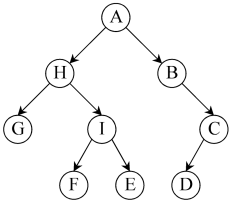Milo Chang
Peter Cao
Milo Chang
Peter Cao
AP Computer Science A 💻
130 resourcesSee Units
Static and Dynamic Types
Now that we have established a little bit about polymorphism in the last topic, let's talk some more about it. Every object has a static type and a dynamic type. Let's use the hierarchy tree from the last topic:

Courtesy of Wikimedia Commons.
Let's make an object a with the following constructor call:
A a = new C();As we can see, the object has two types given to it, A, which is the type the variable is declared as, and C, which is the type that the constructor is calling. The type that the variable is declared as is known as the variable's static type, while the type of the constructor call is known as the variable's dynamic type. These will be useful to know when calling methods.
Method Calling and Polymorphism
Before we move on, consider the following code:
public class A {
public static void callOne() {
System.out.println("1");
}
public void callTwo() {
System.out.println("2");
}
}
public class B extends A {
@Override
public static void callOne() {
System.out.println("3");
}
@Override
public void callTwo() {
System.out.println("4");
}
}
public class Main {
public static void main(String[] args) {
A a = new B();
a.callOne();
a.callTwo();
}
}Here, we have two classes, A and B, where A is a superclass of B. They each have two methods,
callOne(), which is static, and callTwo(), which is not static. The methods in B override those of A. We have made an object with static type A and dynamic type B. When calling callOne() and callTwo(), what will be printed? The key lies in mentioning that
callOne() is static while callTwo() is not. Because callOne() is static, when we call it from a, we use its static type, so callOne() from class A is called and "1" is printed. Meanwhile, because callTwo() is not static, when we call it from a, we use its dynamic type, so callTwo() from class B is called and "4" is printed. Browse Study Guides By Unit
➕Unit 1 – Primitive Types
📱Unit 2 – Using Objects
🖥Unit 3 – Boolean Expressions & if Statements
🕹Unit 4 – Iteration
⚙️Unit 5 – Writing Classes
⌚️Unit 6 – Array
💾Unit 7 – ArrayList
💻Unit 8 – 2D Array
🖲Unit 9 – Inheritance
🖱Unit 10 – Recursion
🙏Exam Reviews

© 2023 Fiveable Inc. All rights reserved.